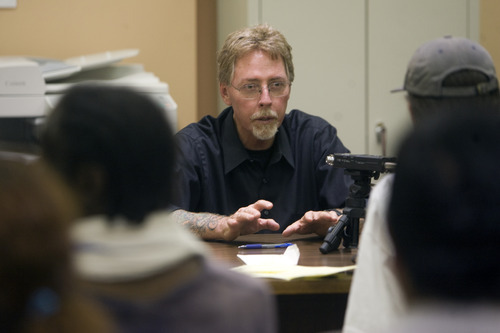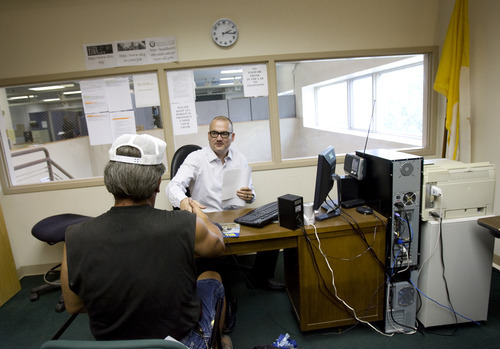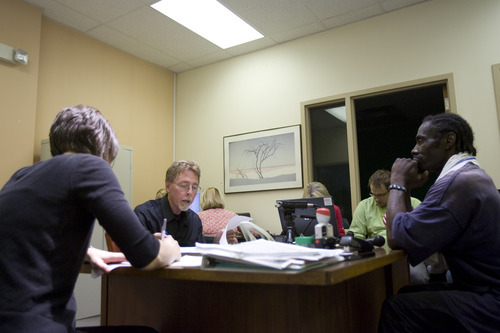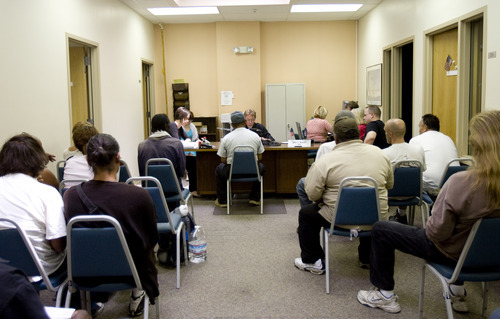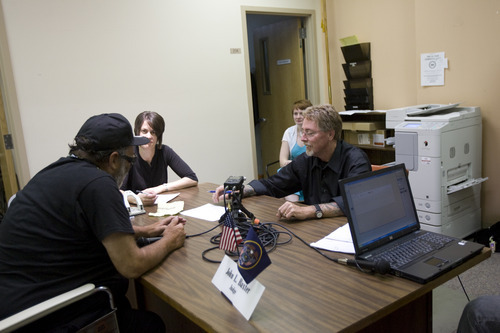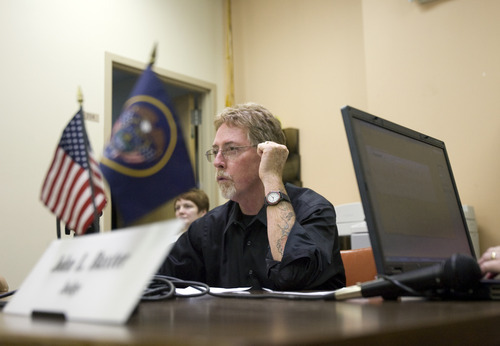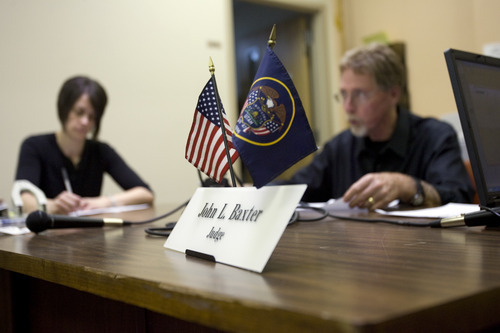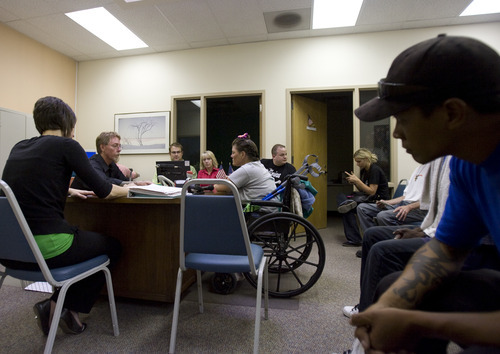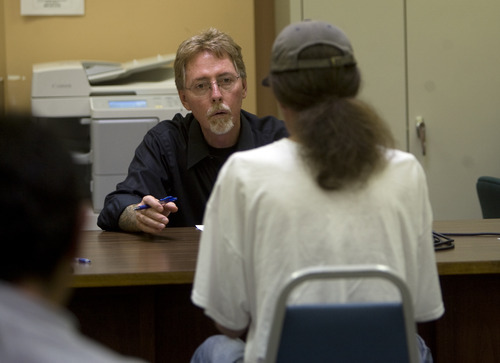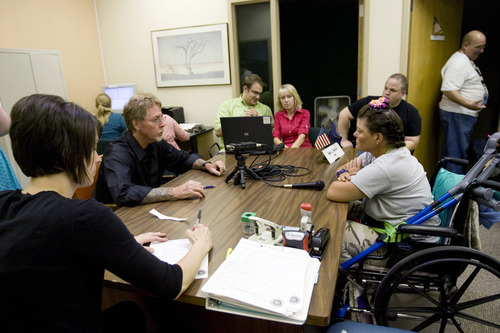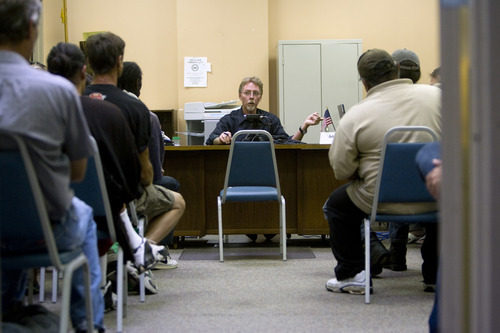This is an archived article that was published on sltrib.com in 2012, and information in the article may be outdated. It is provided only for personal research purposes and may not be reprinted.
"I like Baxter. He's cool, he's fair," said James Stills as he emerged from Salt Lake City's homeless court clutching his stack of nine trespassing tickets.
Stills, 56, has been chronically homeless for 25 years. "Baxter" is Salt Lake City Justice Court Judge John L. Baxter, who sentenced him to community service so that Stills could clear his record of outstanding misdemeanor warrants.
Baxter holds court on the second floor of the Weigand Homeless Day Center on alternating Friday afternoons, bringing a mix of mercy and accountability to the city's street folk.
In May 2004, Baxter launched Salt Lake City's homeless court — one of about 25 in the country, most of them in California.
According to the American Bar Association's Commission on Homelessness and Poverty, the Homeless Court Program was founded in 1989 by San Diego Deputy Public Defender Steve Binder to "counteract the effect of criminal cases pushing homeless defendants further outside society."
Transients receive nuisance citations every day for trespassing, public urination, open containers, littering and the like — and those nonviolent misdemeanors, if unheeded, lead to arrest warrants that serve as roadblocks to accessing services, landing jobs and re-entering society.
But for most homeless people, the law is a harsh taskmaster, courthouses are seen as hostile territory, and robed judges are the enemy.
—
Taking it to the streets • Baxter likened his homeless court sessions to an old TV comedy.
"It feels like 'Night Court' — really busy, mildly chaotic, noisy and funny, and sometimes sad," he said.
Casually dressed in jeans and a shirt that revealed the tattoos on his arms, Baxter sits behind a table at the front of a room lined with several rows of chairs, most of them continually occupied by homeless defendants seeking a new brand of pragmatic justice.
While actual numbers have not been tracked, Baxter said that in one recent three-hour session, he saw 51 clients and handled 150 cases.
"It's not uncommon for people to have several cases," Baxter said. "Plead to one and dismiss two — that's generally the way it works."Instead of unnecessary jail time or fines that jobless defendants have no means to pay, community service is required, and time served in life-skill classes and rehabilitation programs is taken into account.
John Udseth, who runs his own information technology business and has volunteered with Salt Lake City's homeless court for five years, said he's witnessed many signs of success.
"There's a lot of pride when they turn in that community service," Udseth said. "They want to physically hand it to the judge themselves."
The underlying premise of homeless courts, Udseth said, is that the needs of the homeless population fall outside most of the rules of the judicial system.
"We take time to explain things," Udseth said. "There's a lot of compassion here."
In a room adjoining Baxter's court, volunteer paralegals supply forms, and pro-bono lawyers counsel clients about their cases.
Stewart Gollan, a Salt Lake City civil rights attorney, began offering his services free of charge last October.
"They have difficulty in interacting with the legal system on terms that others can," Gollan said. "So people end up avoiding the justice system and have very bad outcomes."
But in this environment, Gollan has witnessed the homeless being held accountable and resolving their legal issues, while at the same time being treated with "a great deal of respect and courtesy."
Rachel Valentine, a Salt Lake City paralegal, lauded the homeless court for its practicality.
"There's storage, showers and phones at the Weigand Center, and people can get help with resumes and job searches," Valentine said. "I think [the on-site court] makes a lot of sense, and I'm really glad to be a part of it."
—
Building bridges • At its inception, police eyed Baxter's homeless court with a degree of suspicion, fearing the lighter sentences would undermine their efforts to maintain order.
"They were concerned at first when I was dismissing cases that I had the power to dismiss," Baxter said.
However, that initial mistrust has melted away.
"When the program first came out, that was a concern," said Salt Lake City police Sgt. Michelle Ross. "But we've gotten past that."
Since last April, Ross has managed the Homeless Outreach Service Team (HOST), a consortium of partners taking a holistic approach to panhandlers and transients.
"We take some of the guys down to Judge Baxter if they don't adhere to the social contract," Ross said.
That contract consists of basic rules set forth to protect area businesses.
"Businesses have made it quite clear that they want patrons," Ross said, "and they don't want people doing laundry in their bathroom sink."
Stills, who has been homeless for more than two decades, said some of his trespassing tickets stemmed from being in public places after curfew. However, with no space to call his own, he said he often feels targeted and harassed by cops.
Phil Xaiz, 50, has been homeless and jobless for the past 16 months, a condition in which the big-rig driver never thought he'd find himself.
Xaiz has lawsuits pending in 3rd District Court against his former boss, which he hopes will result in getting back pay and reinstatement of his suspended commercial driver's license.
"My home was the road," Xaiz explained. "I was the 'taters and toast, coast to coast' guy. Now I'm not."
Last Friday he appeared before Judge Baxter to get a theft charge cleared. He allegedly stole $29 worth of groceries, an infraction that didn't merit the jury trial he wanted.
"I got 35 hours of community service," Xaiz said of the sentence Baxter handed down.
Xaiz maintains he wasn't shoplifting and believes store personnel "profiled" him because of the big red backpack he carried.
"The cops down here hand out tickets for anything and everything," Xaiz said, "from blocking the sidewalk to smoking in the wrong place."
—
Measuring success • No firm data exist comparing the expense and outcomes of homeless court to traditional options. However, the average cost of housing an inmate in the Salt Lake County Jail is $88.64 per day. Sgt. Cammie Skogg, public information officer for the Salt Lake County Sheriff's Office, said that figure represents an average of all services rendered, including booking, food and basic health services.
Emogene Grundvig, a graduate student at the University of Utah, plans to do her doctoral dissertation on Baxter's homeless court, documenting its rate of success and providing a cost-benefit analysis of its operations.
Grundvig has worked with the homeless court and the population it serves since January. As part of her research, she plans to obtain and review relevant police citations, which are more difficult to get than public court records.
"I wanted to talk to homeless and police about goals versus what is happening — to make it more concrete and to see what's going on and why," Grundvig said. She also plans to explore the barriers that block the homeless from getting the help they need "to allow them to live in society."
Stills said he once held a variety of jobs and had a home that he lost "over something stupid." Now on disability and battling several health problems, he's rapidly losing weight and is on a waiting list for housing for the chronically homeless.
"I want a roof over my head, a place to watch TV, cook and eat a nice meal and sleep in a warm bed," Stills said. "I'm 56 years old, and I don't need to be out here anymore."As for Xaiz, the long-distance trucker simply hopes to get his life back on track.
"This is really a very sad place. I call it purgatory, this area of town," Xaiz said. "It's more hell than heaven."
cmckitrick@sltrib.comTwitter: @catmck


